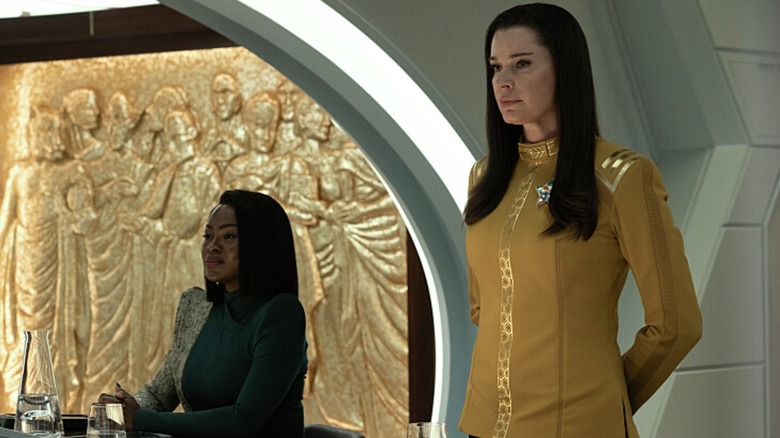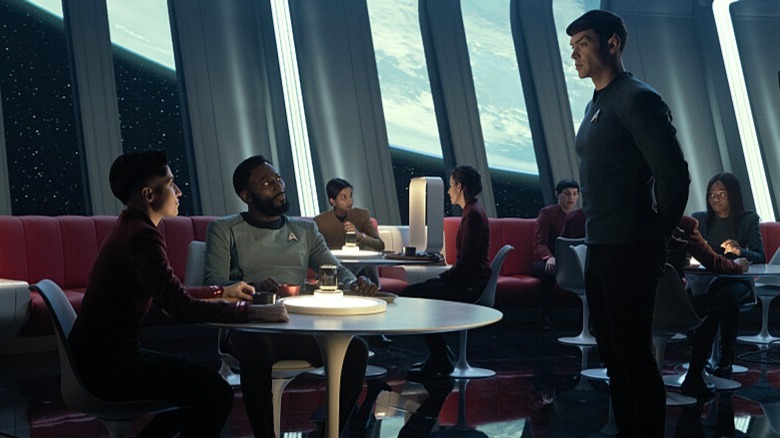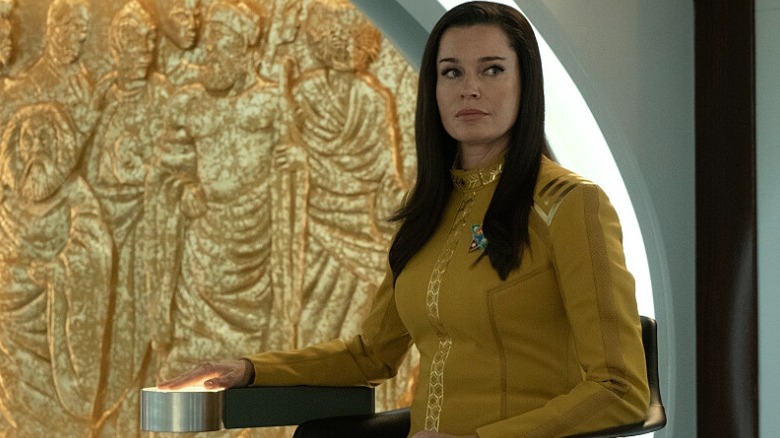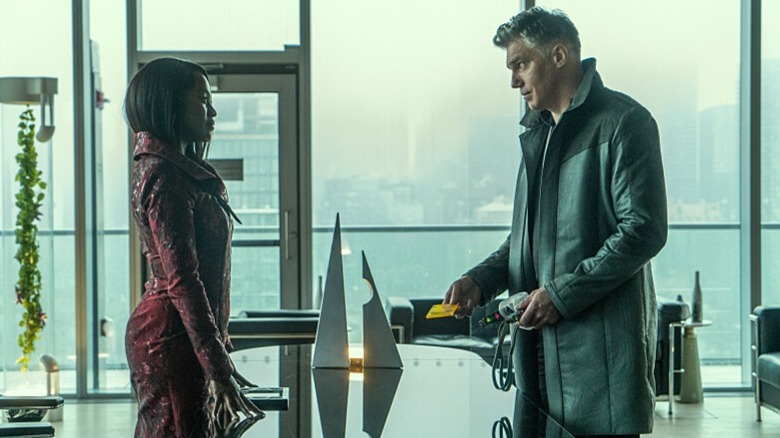Star Trek: Strange New Worlds Goes Full Perry Mason In The Latest Episode
This post contains spoilers through season 2, episode 2 of "Star Trek: Strange New Worlds."
Una Chin Reilly (Rebecca Romijn) is back on the Enterprise. "Star Trek: Strange New Worlds" fans knew the officer best-known as Number One would return at some point, thanks to original series canon and co-showrunner Akiva Goldsman, but we didn't know her return would be quite so dramatic — or triumphant. The character made her way back to the crew after standing trial in what turned out to be, essentially, a landmark civil rights case not just for Una, but for all Illyrians and "augments." For the course of an hour, the best modern "Star Trek" series turned into a showy courtroom drama à la "Perry Mason," making some timely points along the way.
It also paid homage to the courtroom scenes of "Star Trek" past, with guest star Yetide Badaki shaping the action as Una's old friend and current lawyer, Neera. "Star Trek" has a long history of courtroom one-offs, but "Ad Astra per Aspera" seems to draw specifically from its earliest: a season 1 "Star Trek: The Original Series" episode called "Court Martial." In it, Captain Kirk (William Shatner) is put on trial for actions he took during an emergency that seemed to have resulted in the death of a Starfleet Lieutenant Commander.
Trek has been on trial before
As with the latest episode, in "Court Martial," a tribunal of people meets to decide Kirk's fate, and the group gathers in a courtroom where the accused rests their hand on a glowing orb and promises to tell the truth. As with "The Original Series" episode, the prosecutor in "Strange New Worlds" turns out to be a main character's love interest — in that case, Kirk's ex Areel (Joan Marshall), and in this one, Pike's girlfriend Captain Batel (Melanie Scrofano). And in both cases, the trial unfolds not like a typical criminal hearing, but like a TV show court scene, complete with moralizing speeches and last-minute twists of fate that are far more exhilarating than anything that happens in most real-life courtrooms.
Only, in the case of "Ad Astra per Aspera," it turns out to not just be one person on trial, but Starfleet's messed-up, discriminatory policies themselves. The latest episode of "Star Trek" isn't just an homage to both the courtroom drama as a whole and "Court Martial" in particular; it's also a ripped-from-the-headlines indictment of hate-based laws facing people today. "Star Trek" has long since grappled with extremely timely social issues, from episodes of the original series that crafted insightful commentary on war and racism, to last season's exploration of Spock's mixed-species identity. It's no surprise, then, that Una's big episode doubles as an indictment of recent transphobic legislature, but it is a surprise that the show is able to craft a damning argument against said laws while also painting a frightening portrait of what could be our near-future.
An Illyrian horror story
What started as a simple, archaic-sounding rule last season — that genetically modified individuals can't serve in Starfleet — evolved into a wide-ranging allegory this time around. We learn from Una's testimony that when she was growing up, Illyrians who performed body-transforming rituals were arrested, harassed at school, refused service in public and medical care in emergencies, and put at risk of violent hate crimes — all when they were just kids. A decade or so ago, this description would have called to mind European fascist regimes or American Jim Crowe-era racism, but now, it sounds a lot like the present-day treatment of trans kids and adults. The story takes the idea even further, imagining a world where Illyrians eventually did end up segregated, with Una choosing to try to pass in the non-Illyrian community.
"Star Trek" is often sobering, but just as often hopeful, and this week's episode is no exception. Neera uses the stepping stones of a narrative provided by Una to weave an argument not just against her imprisonment, but against the future implementation of the anti-Illyrian statute. Suddenly, this feels less like the showmanship-based climaxes of shows like "Perry Mason" and "Better Call Saul," and more like an argument put before the Supreme Court. This entire episode is a bit more on-the-nose than "Strange New Worlds" has been in the past, but it's held together by Badaki's performance as an assured legal expert who knows exactly what needs to be done to take down the entire BS law.
A climactic courtroom moment brings it all home
Badaki is warm when she assures her client that "the fear you have of yourself, it's not your own. It was drilled into you," but she's clinical when she pokes holes in the argument that Captain Pike (Anson Mount) committed conspiracy by withholding information about Una's status. Instead, she argues, he actually provided Number One asylum from a hostile government (without realizing that's what he was doing), something to which she has every right.
In keeping with the tradition of grandiose, moralizing speeches that Captains Kirk, Picard, and others have delivered over the years — with classic courtroom shows perfecting the format before them — Neera brings the case home by spotting a fool-proof, inarguable loophole in Starfleet's own logic. It might feel a bit like a departure from "Star Trek: Strange New Worlds," but it's a moral victory that perfectly captures the spirit of Gene Roddenberry's original series — and the classic lawyer shows of yore.
"Star Trek: Strange New Worlds" streams new episodes Thursdays on Paramount+.



